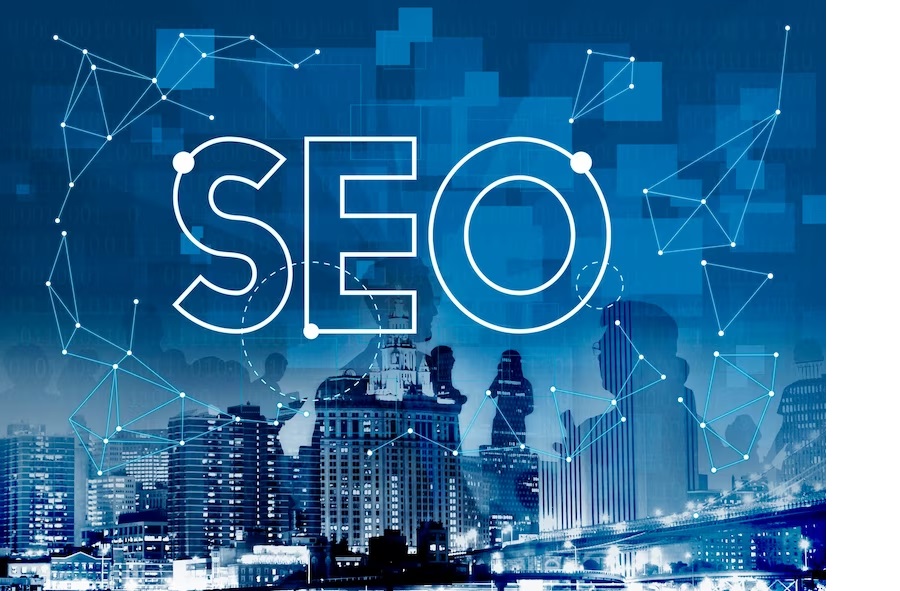Think of SEO as the magic ladder in the digital world. It facilitates the rise of your website in search engine results pages (SERPs) for any keywords related to the business you run. Your website will be seen by more people and attract more potential clients as you rise in the rankings.
Why is search engine optimization so important?

The importance of professional SEO services for businesses in this digital era is highlighted below.
- Visibility: Having a website that ranks higher on search engines saves money on clicks, like having a storefront on a busy digital str
- Credibility: In the eyes of both search engines and users, a high ranking indicates relevance, trust, and authority in the industry.
- Cost-effectiveness: Compared to paid advertising, SEO provides long-lasting organic traffic, resulting in a higher ROI.
- Targeted Traffic: Optimizing for relevant keywords draws qualified leads to your website.
A Journey Through Time: The History and Evolution of SEO
The internet itself has an extensive history that is linked with the battle of search engine supremacy, or SEO. Buckle up for a journey through time, tracing the changes that shaped SEO practices.
The Early Days (1990s)
- Crawling the Wild Web: Prior to Google, websites were organized by search engines such as AltaVista and Yahoo! through keyword submissions and human editors. Link building through link farms, meta tag manipulation, and keyword stuffing were early SEO strategies.
- The Rise of Google (Late 1990s and Early 2000s): Google made its debut with a ground-breaking algorithm that prioritized relevancy. As keyword stuffing was penalized, the significance of natural backlinks and high-quality content was introduced.
The Content Boom (Mid-2000s)
- Content is King: Google penalized low-quality, keyword-stuffed pages and heavily emphasized original, guidable educational content in their Panda and Penguin updates. Long-form content and content marketing get preference. Quality Content is very important for Driving Business Success.
- Social Signals Rise: As a result of the popularity of social media sites like Facebook, LinkedIn, and Twitter, Google began to take social shares and mentions into account when determining rankings. Integrating social media has become a weapon in the SEO toolbox.
The Mobile Revolution (Late 2000s – Early 2010s)

- Mobile-First Indexing: Google announced the implementation of mobile-first indexing, which gives priority to mobile-friendly web pages. Mobile-friendly content and responsive design have become necessities.
- Local SEO Takes Centre Stage: Local searches, such as “restaurants near me,” have increased dramatically as cell phones have become more popular. Geo-targeted content and Google My Business (GMB) optimization are examples of local SEO strategies that have gained traction.
The Age of AI and User Experience (2010s – Present)

- RankBrain and Beyond User satisfaction and engagement are taken into account as ranking variables by Google’s AI-powered RankBrain algorithm. It became essential to consider user experience, which includes website structure, smartphone friendliness, and page performance.
- Voice and Semantic Search: Recognizing user intent and tailoring content to natural language inquiries became necessary with the introduction of voice assistants such as Alexa and Siri. Semantic search gained prominence by emphasizing the semantics of terms.
The Future of SEO: A Blend of Technology and Humanity

As algorithms become more sophisticated and user expectations evolve, SEO will continue to adapt. Expect increased focus on:
- Technical SEO: Making sure the code on a website is organized and neat for the best possible crawling and indexing.
- E-A-T (Expertise, Authoritativeness, and Trustworthiness): It will be crucial to develop user trust and establish your knowledge in your field.
- Personalization and Micro-Moments: Content catered to specific queries at particular moments, optimized for the requirements and intent of each unique user.
Remember: SEO is not a one-time fix but an ongoing process that requires adapting to changing algorithms and user behavior. Embrace the evolution, prioritize long-term value, and keep your audience at the heart of your strategy.
The Early Days of SEO
When it comes to website ranking, the early years were a free-for-all, ranging from the mid-1990s to the early 2000s. The well-known keyword stuffing and the link-building rush were the two most effective strategies.
The Evolution:
Thank goodness search engines changed. When Google debuted PageRank in 1998, the rules were changed. It successfully reduced the value of link farms and low-cost schemes by concentrating on the relevancy and quality of backlinks. As algorithms grew more complex, they began to penalize keyword stuffing and reward excellent user experience and content.
Lessons Learned:
The early days of SEO offer valuable lessons:
- Quality over quantity: Content is king (and queen) above quantity! Make sure the content is relevant, engaging, and educational so that readers will want to read it.
- Obtaining Links is Preferable to Purchasing Them: Create high-quality, organic backlinks from relevant websites. Provide insightful content that people will want to share.
- Keep it Ethical: Avoid trying to manipulate the system. Put your attention into giving your audience a positive user experience and creating lasting value.
The Current and Upcoming SEO Trends in 2024:

The search engine landscape is set to undergo significant changes in 2024, with a focus on AI integration, high-quality content, and user experience. Here are some of the top trends and predictions:
- AI Integration: As AI technologies advance, they will be included in SEO and content development workflows. To raise search engine ranks, this also applies to the usage of expert-written and AI-generated content.
- Google Search Generative Experience (SGE): Google is anticipated to release a number of significant features and enhancements, such as SGE, which will encourage the production of expert content and raise the standard of search engine results.
- Content Expertise and Quality: To differentiate themselves from the competition, brands must produce helpful, captivating, and high-quality content. It means focusing on insight-rich storytelling content that incorporates multimedia elements where possible.
- Greater Online Presence: The goal of SEO will now be to create a more significant online presence rather than only rank a website highly on search engines. This entails maintaining a consistent brand messaging and being visible on a range of digital media.
- Voice Search Optimization: Content optimization for voice search inquiries will become more crucial as voice search usage grows.
- Mobile Optimization: To guarantee a smooth user experience, websites must be optimized for mobile devices, given the increasing trend of people using these devices to browse the internet.
- Emphasis on Local SEO: As more people turn to search engines to locate local content and services, local SEO will become increasingly important.
- Video optimization: As video content grows in popularity, search engine optimization of videos will become a crucial component of any SEO plan.
- Personalization: AI-powered personalization will be used more often in SEO to provide clients with recommendations for more relevant and customized information.
- Social Media Impact on Rankings: Businesses must have an active social media presence since social media will continue to have a significant impact on search engine results.
- To adapt to these changes and maintain a competitive edge in the landscape, it is crucial to stay informed about the latest trends, follow best practices, and maintain a consistent approach to content creation and optimization.
The Rise of Voice Search

Over the past few years, voice search has been increasingly becoming more popular due to the rising demand for virtual assistants such as Siri, Google Assistant, and Alexa. It is predicted that the growth of voice search will have a significant impact on SEO in 2024. Conversational keywords will be the most popular, and search engine optimization experts will need to employ voice-specific techniques, such as “near me” search engine optimization, voice search analytics purchases, and comprehension of the subtleties of voice search intent. Analysis of voice search data will be essential to improving SEO tactics. It is anticipated that 125.2 million people will be using voice search by 2024, and the global voice recognition market will grow to $27.16 billion. Companies can rank higher in search results by optimizing content for voice search to make it easily accessible for users. Making sure mobile optimization, secure connections, and fewer invasive pop-ups are all part of optimizing for voice search Voice search is predicted to become a critical component of digital marketing. Businesses that prioritize voice search optimization will benefit in the years to come.
AI and SEO

Search Engine Optimization is undergoing an essential change thanks to artificial Intelligence (AI). Here are a few methods for doing so:
- AI-Powered Search Algorithms: AI has the power to enhance search algorithms, leading to more precise, tailored, and effective search results. As an illustration, consider Google’s RankBrain, which leverages machine learning to provide more relevant search results by better understanding user intent.
- Improved Keyword Research and Content Optimization: Artificial Intelligence (AI) will automate and enhance processes such as recognizing search trends, comprehending the semantic linkages between terms, and forecasting user behavior. Additionally, it can help optimize material so that users find it exciting and relevant.
- Improved User Experience: Since search engines give preference to websites that provide an excellent user experience, user experience is significant.
- Automation of SEO tasks: AI is being used to automate a lot of the technical parts of SEO, such as relevancy and better search results. Because of this, experts are able to save time and focus on more strategic activities like link-building and content strategy.
- AI SEO Tools: There are tons of AI-powered tools available that help experts optimize their websites for improved search engine performance by utilizing machine learning algorithms and other AI technologies.
Because AI allows search engines to comprehend user intent and deliver more relevant search results, SEO is being revolutionized. This means that instead of concentrating on conventional keyword-based techniques, marketers should concentrate on producing engaging, high-quality content that fits with search intent. AI is changing SEO and content marketing for marketers. Artificial Intelligence relieves marketers of time-consuming analytical tasks, allowing them to focus on creating more innovative content.
The Impact of AR and VR on SEO
Virtual Reality (VR) and Augmented Reality (AR) have broad and substantial potential effects on SEO. The following important information is derived from the search results:
Augmented Reality (AR) and Local SEO:
- Because both AR and local SEO emphasize location, they are closely related. Numerous augmented reality apps rely on location-based inputs or employ precise locations, which may affect local SEO services.
Virtual Reality (VR) and Image Search for SEO:
- It is anticipated that VR’s integration with image search for SEO will improve user experience and engagement, which will increase website visibility and ranking on search engine results pages.
Unique SEO Strategy for VR and AR Content:
- Compared to traditional, optimizing VR and AR content for search engines calls for a different strategy. In addition to making sure search engines can find and index VR and AR experiences, it involves optimizing meta tags, keywords, and site structure.
Impact on User Experience and Engagement:
- In addition to improving user engagement and satisfaction, AR and VR can also improve a website’s visibility and search engine ranking—all of which are crucial SEO components.
Virtual Environment Optimization (VEO)
- As virtual and augmented reality becomes more and more critical in the field of digital marketing, the idea of Virtual Environment Optimization (VEO) is beginning to take shape as a possible progression of search engine optimization (SEO).
Challenges and Opportunities:
- There are particular difficulties in optimizing VR and AR content for search engines, but these may be addressed by businesses with careful strategy and execution. To be at the forefront of SEO in the VR and AR space, one must continue to be aggressive and flexible.
In conclusion, through their effects on user experience, image search, local SEO, and the state of digital marketing as a whole, AR and VR have the potential to have a significant impact on SEO. Businesses and marketers will need to be aware of these technologies’ effects on SEO as they develop and become more ingrained in a variety of industries, including digital marketing.
Conclusion
In 2024, being updated with SEO trends will be crucial to success in digital marketing. Keeping up with search engine updates guarantees that your website is constantly optimized for optimal visibility and natural traffic. You may change your SEO tactics and stay one step ahead of your rivals by being aware of changing trends. 2024 will see a number of significant developments in SEO, including voice search optimization, deeper AI integration, mobile optimization, a focus on local SEO, video optimization, personalization, and the influence of social media on results. It’s critical to keep oneself up to date on the most recent advancements in digital marketing and your sector by familiarizing yourself with updates on a regular basis, evaluating shifts in relevance, and maintaining connections with trustworthy sources. Effective ways to accomplish this include:
- Networking with peers and industry professionals.
- Going to local events and meetups.
- Subscribing to top blogs and email newsletters.
- Participating in communities and forums.
Recall that SEO is a dynamic sector where one must be willing to experiment and adapt in order to stay current. You can keep on top of the game and make sure your SEO efforts are in line with the most recent developments by doing analysis and making adjustments.








